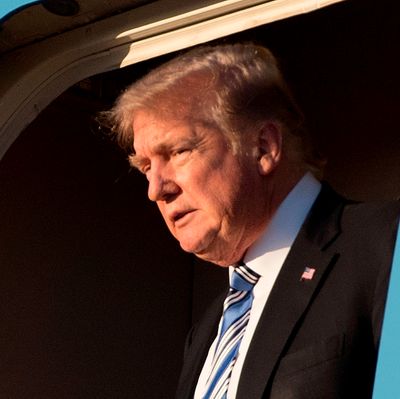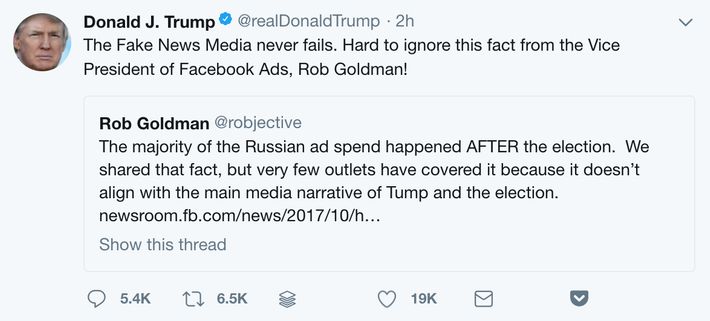
One day after Special Counsel Robert Mueller indicted 13 Russian nationals and detailed how Russian operatives sought to disrupt the 2016 presidential election — mostly in support of Donald Trump — the president was once again trying to discredit the idea that he was the intended beneficiary of the Kremlin’s efforts. On Saturday, Trump retweeted comments from Facebook ads vice-president Rob Goldman, who on Friday criticized the media for what he claimed was an overall mischaracterization of Russian operatives’ mission. In the two tweets Trump highlighted, Goldman said that:
Most of the coverage of Russian meddling involves their attempt to effect the outcome of the 2016 US election. I have seen all of the Russian ads and I can say very definitively that swaying the election was *NOT* the main goal. The majority of the Russian ad spend happened AFTER the election. We shared that fact, but very few outlets have covered it because it doesn’t align with the main media narrative of T[r]ump and the election.
Trump characteristically framed Goldman’s comment as another exposé of the “Fake News Media”:

In the rest of his Twitter thread, Goldman went on to argue that Russia’s main intent was to exacerbate political discord and turn us against each other.
According to the Mueller indictment, Russian operatives, and in particular the Russian-owned Internet Research Agency, did indeed seek to disrupt the U.S. political system and sow discord — mostly by attempting to interfere with the 2016 election. And most of the efforts detailed in the indictment were designed to support Trump or defeat Hillary Clinton.
Asked for comment about Trump’s Goldman retweet by BuzzFeed, Facebook just pointed to a far less-noticed reply where Goldman admitted he couldn’t speak to Russian operatives’ ultimate goal, just their perceived one as could be discerned by which Facebook ads they ran. In other words, Goldman admitted that he had a limited view of the problem and could not, in fact, “very definitively say” that swaying the election was not the Kremlin’s main goal.
Last October, Facebook reported that 44 percent of the views the Russian ads received occurred before Election Day. But that’s not the whole picture, either, since Facebook has calculated that, with the help of unpaid posts, as many as 126 million Americans saw content pushed by Russian operatives, whereas only around 10 million are estimated to have seen the paid ads.
Indeed, buying ads was only one of the ways Russian operatives used Facebook and Instagram to accomplish their aims. On Saturday, the New York Times highlighted how Facebook was the “digital instrument of choice” for the Russian effort, explaining how the Mueller indictment “detailed how the Russians repeatedly turned to Facebook and Instagram, often using stolen identities to pose as Americans, to sow discord among the electorate by creating Facebook groups, distributing divisive ads and posting inflammatory images.”
Facebook also doesn’t have the best track record when it comes being transparent about how the platform was weaponized during the election. CEO Marc Zuckerberg originally dismissed the idea that fake news popularized on Facebook had been a problem. This fall, he admitted he was wrong and that the company had been taken advantage of, but as explained in Wired’s epic new look at the company’s past two years, Facebook hasn’t had its finest moment coming to terms with that fact.






























